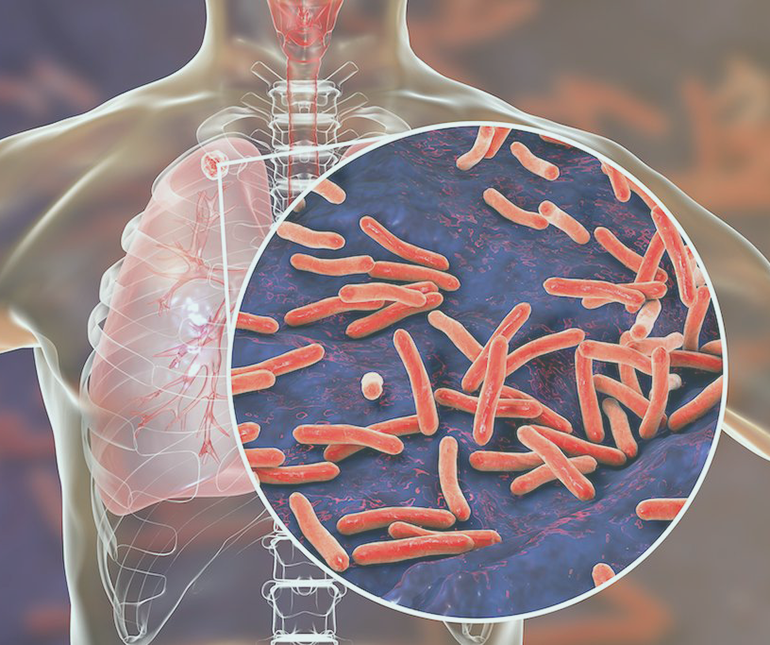Tuberculosis

Tuberculosis (TB) is a potentially serious infectious disease that mainly affects the lungs. The bacteria that cause tuberculosis are spread from person to person through tiny droplets released into the air via coughs and sneezes.
Once rare in developed countries, tuberculosis infections began increasing in 1985, partly because of the emergence of HIV, the virus that causes AIDS. HIV weakens a person's immune system, so it can't fight the TB germs. In the United States, because of stronger control programs, tuberculosis began to decrease again in 1993. But it remains a concern.
Many tuberculosis strains resist the drugs most used to treat the disease. People with active tuberculosis must take many types of medications for months to get rid of the infection and prevent antibiotic resistance.
Symptoms
Although your body can harbor the bacteria that cause tuberculosis, your immune system usually can prevent you from becoming sick. For this reason, doctors make a distinction between:
Latent TB. You have a TB infection, but the bacteria in your body are inactive and cause no symptoms. Latent TB, also called inactive TB or TB infection, isn't contagious. Latent TB can turn into active TB, so treatment is important.
Active TB. Also called TB disease, this condition makes you sick and, in most cases, can spread to others. It can occur weeks or years after infection with the TB bacteria.
Signs and symptoms of active TB include:
1. Coughing for three or more weeks
2. Coughing up blood or mucus
3. Chest pain, or pain with breathing or coughing
4. Unintentional weight loss
5. Fatigue
6. Fever
7. Night sweats
8. Chills
9. Loss of appetite
Causes
Tuberculosis is caused by bacteria that spread from person to person through microscopic droplets released into the air. This can happen when someone with the untreated, active form of tuberculosis coughs, speaks, sneezes, spits, laughs or sings.
Although tuberculosis is contagious, it's not easy to catch. You're much more likely to get tuberculosis from someone you live or work with than from a stranger. Most people with active TB who've had appropriate drug treatment for at least two weeks are no longer contagious.
HIV and TB
Since the 1980s, tuberculosis cases have increased dramatically because of the spread of HIV, the virus that causes AIDS. HIV suppresses the immune system, making it difficult for the body to control TB bacteria. As a result, people with HIV are much more likely to get TB and to progress from latent to active disease than are people who aren't HIV positive.
Drug-resistant TB
Tuberculosis also remains a major killer because of the increase in drug-resistant strains. Over time, some TB germs have developed the ability to survive despite medications. This is partly because people don't take their drugs as directed or don't complete the course of treatment.
Drug-resistant strains of tuberculosis emerge when an antibiotic fails to kill all of the bacteria it targets. The surviving bacteria become resistant to that drug and often other antibiotics as well. Some TB bacteria have developed resistance to the most commonly used treatments, such as isoniazid and rifampin (Rifadin, Rimactane).
Some TB strains have also developed resistance to drugs less commonly used in TB treatment, such as the antibiotics known as fluoroquinolones, and injectable medications including amikacin and capreomycin (Capastat). These medications are often used to treat infections that are resistant to the more commonly used drugs.
Risk factors
Anyone can get tuberculosis, but certain factors can increase your risk, including:
Weakened immune system
A healthy immune system often successfully fights TB bacteria. However, several conditions and medications can weaken your immune system, including:
1. HIV/AIDS
2. Diabetes
3. Severe kidney disease
4. Certain cancers
5. Cancer treatment, such as chemotherapy
6. Drugs to prevent rejection of transplanted organs
7. Some drugs used to treat rheumatoid arthritis, Crohn's disease and psoriasis
8. Malnutrition or low body weight
9. Very young or advanced age